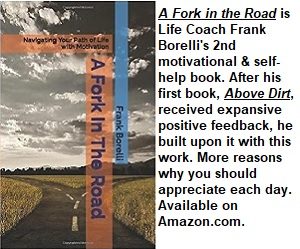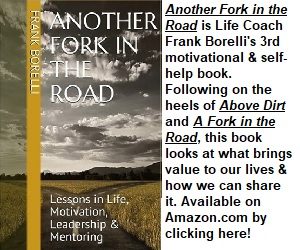Most of my friends know that I’m an NCIS fan. Before that I was a freak for Walker: Texas Ranger (the original; not the remake). On NCIS, Special Agent Leroy Jethro Gibbs is a former Marine (Gunnery Sergeant) Scout Sniper and he just so happens to have a rule for darn near everything. If you’re a fan of the show then you know why he developed those rules and you appreciate the humor when so many of them are cited. If you’re not familiar with “Gibbs’ Rules” I invite you to do a Google search and you’ll find several reference sites with them. In the Borelli household we have a set of rules as well, but never before have I tried to actually list them. I could cite them, but they weren’t numbered like Gibbs’. SO… it was suggested to me that I do precisely that. Here we go.
 1) Just don’t quit. Easier said than done at times, but this is simple none-the-less. As I told both my oldest children when they enlisted in the service (and as I repeated to my younger daughter when she contemplated a stint in the service), the only person in the world who can make you quit is the person in the mirror. There is no good reason for that person to give you permission to quit or to ask you to quit. Sure, you might fail sometimes, but if you view each “failure” as a learning experience then the next time around you’ll do better. As long as you keep trying then you haven’t quit – and you haven’t lost until you’ve quit. Life hasn’t beaten you until you give up.
1) Just don’t quit. Easier said than done at times, but this is simple none-the-less. As I told both my oldest children when they enlisted in the service (and as I repeated to my younger daughter when she contemplated a stint in the service), the only person in the world who can make you quit is the person in the mirror. There is no good reason for that person to give you permission to quit or to ask you to quit. Sure, you might fail sometimes, but if you view each “failure” as a learning experience then the next time around you’ll do better. As long as you keep trying then you haven’t quit – and you haven’t lost until you’ve quit. Life hasn’t beaten you until you give up.
2) You don’t have to like it, you just have to do it. Anyone who’s ever been in the service is familiar with this one. Sometimes the orders you’re given just suck but that doesn’t excuse you from following them. Cleaning up behind your dog in the backyard isn’t fun. You don’t have to like it – you just have to do it. Often the thing you don’t like to do but have to do anyway is the next hurdle you clear in not quitting.
 3) Focus on the goal; ignore the distractions. When I enlisted in the Army and entered Basic Training my father was, shall we say, less than supportive. He had plans for me that involved college and doors in law firms with my name on them. That outlook from him was expressed in his letters to me during Basic Training and Military Police School. Those feelings, on his part, were a distraction to me. They misdirected my attention and made me think about things that weren’t pertinent to my successful completion of my training. Successful completion of that training was my mission at the time. I had to learn to ignore the distractions and focus on the mission. The lesson applies throughout life.
3) Focus on the goal; ignore the distractions. When I enlisted in the Army and entered Basic Training my father was, shall we say, less than supportive. He had plans for me that involved college and doors in law firms with my name on them. That outlook from him was expressed in his letters to me during Basic Training and Military Police School. Those feelings, on his part, were a distraction to me. They misdirected my attention and made me think about things that weren’t pertinent to my successful completion of my training. Successful completion of that training was my mission at the time. I had to learn to ignore the distractions and focus on the mission. The lesson applies throughout life.
4) Always be charitable but never be a victim. My father once told me that if a person asked for my help I should always give it if I could. He also told me that if a person ever demanded something of me that I didn’t want to give then I should refuse it and fight to maintain my position. Later he “fine tuned” this message to be more specifically financial. “If a man asks you for a dollar and you can afford to give it, always give it. It’s your human duty. If the man demands a quarter and you either can’t afford to give it or don’t want to, fight to keep the quarter.” He went further to say, “Make that man be willing to die for the quarter, because you should be willing to fight to the death to keep what’s yours.” This is not a popular outlook in today’s world, but I feel it is still very applicable. Always be charitable when you can. Never be a willing victim.
 5) Never leave the house without a knife, a gun and a lighter. These words came from my Uncle Don Ingram, a USMC Vietnam Veteran. Of course he added all the proper caveats about only doing so legally. When I inquired as to why I needed these three items he explained that with them I could catch food, clean food and cook food (hunt it, skin it and make a fire to cook it over). It made sense to me and to this day I don’t leave my house without – at a minimum – a knife and a lighter. Usually there’s more than one knife and more often than not, there’s also a gun… legally. (My family has compared this to Gibbs’ Rule #9: “Never go anywhere without a knife.” It’s a rule we’ve observed for as far back as I can remember.)
5) Never leave the house without a knife, a gun and a lighter. These words came from my Uncle Don Ingram, a USMC Vietnam Veteran. Of course he added all the proper caveats about only doing so legally. When I inquired as to why I needed these three items he explained that with them I could catch food, clean food and cook food (hunt it, skin it and make a fire to cook it over). It made sense to me and to this day I don’t leave my house without – at a minimum – a knife and a lighter. Usually there’s more than one knife and more often than not, there’s also a gun… legally. (My family has compared this to Gibbs’ Rule #9: “Never go anywhere without a knife.” It’s a rule we’ve observed for as far back as I can remember.)
6) Always have a flashlight. Yes it may seem a strange thing to take with you every day everywhere you go, BUT… especially with today’s LED technology and lithium batteries, it’s all too easy to carry a compact light comfortably. I’ve been in more than one place when the power has gone out for whatever reason and I’ve pulled out my flashlight. It’s always entertaining to see the looks on people’s faces. The first expression is, “Why do you have a flashlight?” The second is, “Thank God you have a flashlight!” We humans are (usually) inherently afraid of the dark, so why put ourselves into it?
 7) It’s always better to have it and not need it than to need it and not have it. Doesn’t this apply across the spectrum of life? It’s an axiom I’ve heard throughout my life and I can’t cite an original source.
7) It’s always better to have it and not need it than to need it and not have it. Doesn’t this apply across the spectrum of life? It’s an axiom I’ve heard throughout my life and I can’t cite an original source.
8) There’s no peace without justice. Just because there is no conflict where you are at that moment in time doesn’t mean everything is peaceful. Peace requires that no conflict exists AND that people live in a fair and just manner with respect to their rights and liberties. Many tyrannies have been “peaceful” because the dictator or tyrant was vicious in his discipline or “law enforcement”. The presence of justice requires fairness and impartiality in peace keeping and respect for every person’s rights and liberties.
9) Family should never fight alone. Neither should your partner. I have six brothers and two sisters. Four of my brothers are US Marines (former). Two of them – out of the blue one day – told me to remember something: “We can fight amongst ourselves, but we’ll brook no one else fighting with any of us. We always stand together.” Right, wrong or indifferent, family should never fight alone.
 10) Never miss a chance to tell your family you love them. My father died quite unexpectedly in relatively good health. It was a freak accident that occurred while my mother was in the bath. She never heard him. By the time he was found he had passed. My point is that the unexpected occurs all the time. I don’t espouse saying “I love you” just so someone can hear the words, but take a minute and think about it and really let your family know you love them when you have the chance. You may not get another one. It’s also worth noting that saying “I love you” isn’t always as good as doing something to show it. Consider this and answer the question to yourself: when was the last time you spontaneously did something for someone you love just because you could and you knew they’d appreciate it?
10) Never miss a chance to tell your family you love them. My father died quite unexpectedly in relatively good health. It was a freak accident that occurred while my mother was in the bath. She never heard him. By the time he was found he had passed. My point is that the unexpected occurs all the time. I don’t espouse saying “I love you” just so someone can hear the words, but take a minute and think about it and really let your family know you love them when you have the chance. You may not get another one. It’s also worth noting that saying “I love you” isn’t always as good as doing something to show it. Consider this and answer the question to yourself: when was the last time you spontaneously did something for someone you love just because you could and you knew they’d appreciate it?
11) Always try to be the person your pets see when they look at you. My son read this one and looked at me with that “huh?” look on his face. Every time I came home, my dog came trotting over to the door to greet me (if only our family was always this delighted to see us?). Every time I walked by him he’d raise his head and wag his tail. Our pets know we care for them and give them love. Even when we’re grumpy or sour (and hopefully we don’t take it out on them) they still love and adore us. They view us through innocent eyes that see us only as the people who control their world. I hope that I’m always as good as the person they see when they look at me.
 12) It’s always easier to learn from someone else’s mistakes but the lessons never sink in as far as learning from you own. I wish I could see every reader as they read this – because I’d enjoy watching each of you chuckle and nod your head. I WISH I could have learned from every mistake my father ever made. I tried to pay attention to the lessons he taught me. Still, sometimes you just have to find out some things for yourself and when you bear your own pain, penalty or punishment for screwing up you learn in a vastly more efficient fashion than you do listening to someone else tell you about their experience.
12) It’s always easier to learn from someone else’s mistakes but the lessons never sink in as far as learning from you own. I wish I could see every reader as they read this – because I’d enjoy watching each of you chuckle and nod your head. I WISH I could have learned from every mistake my father ever made. I tried to pay attention to the lessons he taught me. Still, sometimes you just have to find out some things for yourself and when you bear your own pain, penalty or punishment for screwing up you learn in a vastly more efficient fashion than you do listening to someone else tell you about their experience.
13) You can never tell just one lie. When we talk to the people in our lives, whether it’s family, friends or workmates, we inevitably answer questions about various things. If you lie to any one of those questions, you will have to lie to virtually every related follow on question that is asked. The ONLY safe lie you can ever tell is the answer you give when your wife asks how that dress makes her butt look… and you’d better be darned convincing then!
14) Work smarter; not harder. My son asked me about this one too. I tried to give him an example of a simple task that you could work hard at (digging a 10 foot square ditch five feet deep with a gardening spade) that you could complete more easily and quickly if you worked smarter (by getting a bigger shovel). He was only twelve and he understood immediately. It’s not rocket science or brain surgery folks. If there’s two ways of accomplishing the same task in an equal fashion choose the easier way. Why wouldn’t you?
15) Never assume; never take anything for granted. This is one that, when we ignore it, has bitten us ALL in the butt. The most innocuous example is when we get an email that has some horrendous message in it and, without verifying the contents and veracity of the email info, we forward it on. Usually one of our friends WILL check out what we’ve sent and send us back a message that says, “Maybe next time you should check this kind of stuff out before forwarding it.” (the impact of this and the number of incidents that occur thus, have increased vastly with the expansion of social media. People repost stuff all the time without taking any time to verify it – and the more extreme it is, the faster it seems to be shared). And we learn because we just made ourselves look a bit foolish. There are much larger examples of life experiences this can apply to and anyone over 21 will admit to them. Those under 21… well… they just won’t admit to it because they are often still too busy knowing it all. Not all of them, mind you, but a good number of them. Eventually, as we grow up (or grow old, one or the other) we learn this lesson all too well.
16) Learn something new every day. Follow on to this: The day you stop learning is the day you start dying. I wish I could cite the source, but I believe this is true. It doesn’t matter what you learn each day and perhaps the first greatest lesson we all need to learn is that we know so very little. There are some things I’m considered “expert” at or about, and in all of those topics I know people who I believe have forgotten more than I’ll ever learn. In other words, they are FAR more expert than I am. Make it a point to learn something new each day, no matter what the topic (although it helps if it’s something you’re interested in). Make this a conscious effort. If your day is ending and you can’t think of anything new you learned that day, FIND something. With the internet and smart phones such a common part of every day, it’s easy enough to pick up your phone and Google something… anything. Learn something new every day.
17) There is no price on your integrity. I’ve known people who were willing to compromise their values and commit actions or make statements that they disagreed with or thought were wrong. Why did they do that? For money. They did it to increase the size of their bank account. Every time you compromise your values or act in violation of your integrity simply to make a profit, you irretrievably lose a piece of your soul. The value of your integrity cannot be measured. It cannot be bought. If it can be, then you simply have none.
If you have any “family rules” or personal rules that you regularly live by, please feel free to share them. frank@frankborelli.com
